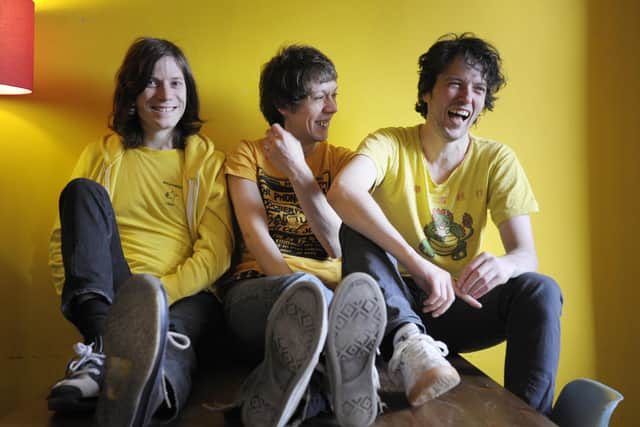Album reviews: Regina Spektor | Hollie Cook | The 1990s


Regina Spektor: Home, Before and After (Warner Records) ****
Hollie Cook: Happy Hour (Merge) ****
The 1990s: Nude Restaurant (Last Night From Glasgow) ****
Despite, or maybe because of big changes in her life – motherhood, global pandemic, you know the sort of thing – Regina Spektor holds to the timelessness of her music on her eighth album, and first in six years. Home, Before and After was recorded in isolation during the pandemic in a converted church in upstate New York. Spektor would not even enter the control room with producer John Congleton and the magnificent orchestral flourishes were beamed in from an outfit in Macedonia.
Advertisement
Hide AdAdvertisement
Hide AdHowever, rather than produce some solitary, intimate work, Spektor has amped up the scale of her compositions, which have always had an idiosyncratic drama anyway. Becoming All Alone opens as a luminous ballad, layers on an almost rudely obtrusive shuffling beat and then full-on strings before retreating back to the more winsome, witty piano ballad for which Spektor is known – instead of a deal with God, she has a beer with God, asking impertinent questions.
Spektor mines her East European and classical backgrounds effectively with bonus synth strings and bassy blasts on Up the Mountain before working in an unexpected soulful middle eight which honours the gospelly song title. She inhabits her protagonist compassionately on One Man’s Prayer (“I just want some girl to look my way”) while Raindrops is a timeless tribute to the highs and lows of everyday romance, which could easily fit into a street scene in a musical.
This is classic, fluent Spektor with her breathy voice skipping over the top of her signature light but intricate piano runs. If it sounds old school that’s because it is – along with the over-produced Loveology, it’s a song she has been holding on to for 20 years. What Might’ve Been is newer but a typical example of her thoughtful lyricism as she outlines a succession of oppositional pairings (“bombing and shelters go together”) to make you think.


In an album of dynamic contrasts, zeroing in and panning out, Spacetime Lullaby is the most epic expression, a nine-minute swirling classical fantasia, with harp, fluttering flute, timpani and even a tap dancer who shuffles along to Spektor’s perky piano interlude, building to a stormy symphonic climax and then fading out with some light jazz piano.
Summer is sorted now that Hollie Cook has released her new album. The daughter of Sex Pistol Paul Cook and one time touring member of The Slits is a purveyor of old school roots reggae, with a sweet soul voice from which to drink deeply and a band, General Roots, who supply the dub vibrations, organic horns and psychedelic Hammond organ. Producer Youth does excellent work teasing out the plaintive skank of Full Moon Baby and the airy, melodic lovers rock of Kush Kween. Moving On blends lithe string arrangements with dub resonance, while Unkind Love teams a brass fanfare, organ drone and burbling synths like a cool, refreshing cocktail, with an infusion of bittersweet yearning to add an edge of emotional piquancy.
Gleeful Glasgow glam trio The 1990s make a welcome return with a third album which was recorded a decade ago and has languished ever since. Thankfully their irreverent catchy pop and low-slung garage rock’n’roll doesn’t have a sell-by date and these former and current members of The Yummyfur, Franz Ferdinand and V Twin are just the post-lockdown tonic with the big, bold glam pop of Walk the Plank, the Stonesy strut of What’s Up With the Midnight Me, rollicking distortion of Psychic Canada and their playful rhyming couplets such as “she’s all jacked up from the get-go, she get a little argumento, but that’s just double espresso” from (My Baby’s) Double Espresso.
CLASSICAL
Liszt: Pianos Concertos Nos 1 & 2 / Piano Sonata (Rubicon) ****
Advertisement
Hide AdAdvertisement
Hide AdAmid the myriad lollipops and showpieces that define the vast catalogue of Liszt’s piano works, the two completed Piano Concertos and the B minor Sonata surely represent the concrete core. They are what the 30-year-old British pianist Alexander Ullman pits his powerful musical intellect and effortless technical facility against in this hardcore album. Winner of two major international Liszt Festivals, his mastery is self-evident in the feverish melodrama of the First Concerto, monumentally expressive in the more intense deliberations of the Second (his melting conversation with Susan monks’ solo cello in the second movement an unquestionable highlight), while in the Piano Sonata cutting a winning fusion of intimacy and outpouring. The latter’s complex fugue is brilliantly articulate. Andrew Litton conducts a robust BBC Symphony Orchestra in the concertos, though occasional brashness reduces some moments to mere gesture rather than recognising the musical significance they deserve. Ken Walton
JAZZ
Brian Molley Quartet with Krishna Kishor: Intercontinental (BGMM Records) *****
Glasgow saxophonist Brian Molley is no stranger to India and this exuberant collaboration sees his seasoned quartet with pianist Tom Gibbs, bassist Brodie Jarvie and drummer Stuart Brown joined by distinguished Chennai percussionist Krishna Kishor (look for them at the Fringe). They open auspiciously with The Crocodile and the Plover Bird, piano and sax developing with expansive warmth and restrained muscle, while the subsequent Lotus and Thistle is a wonderfully piquant dialogue between tenor sax and Indian percussion. Ayemenem (the village of Arundhati Roy’s God of Small Things) features a lyrical, Eastern-inflected melody on multitracked soprano sax and flute, rejoicing over Kishor’s irresistibly fast-forward percussion and staccato Konokol vocables. An improbable sounding interlude, Burns’s Ae Fond Kiss turns out to be a warm-hearted sax-piano duet, while Ramal Dabke closes the album on a high, its slow prelude bursting into a gloriously hectic excursion. Jim Gilchrist